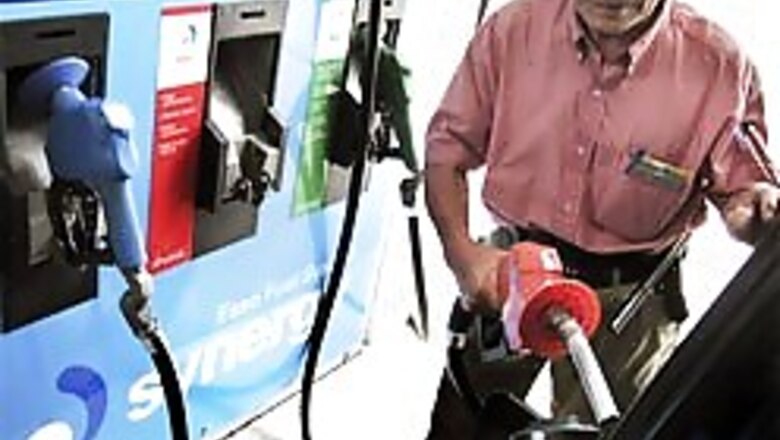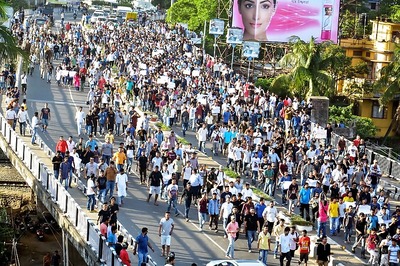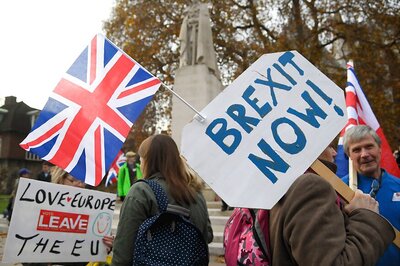
views
New Delhi: India agreed to raise its petrol and diesel prices by about 10 per cent on Wednesday, more than expected, curbing losses at its state-owned refiners but stoking inflation and risking a political backlash ahead of elections.
After 10 days of debate over the price increase, the cabinet also agreed to cut the import duty on crude oil to support refining and retailing firms like Indian Oil Corp, Bharat Petroleum Corp and Hindustan Petroleum Corp.
The price of petrol, currently 45.5 a litre in New Delhi, will rise by Rs 5, or 11 per cent, while diesel, which retails at Rs 31.5, will cost Rs 3 more, or 9.5 per cent, Petroleum Minister Murli Deora told reporters.
Saumitra Chaudhuri, Economic Adviser, ICRA, New Delhi: "Revenues will definitely be affected. This is an unsatisfactory outcome ... Neither the economic purpose nor the political purpose will be adequately served. Inflation will definitely go up by the middle or third week of June. The fiscal deficit will definitely go up. You cannot stop it. It is a set back for fiscal consolidation."
N R Bhanumurthy, Economist, Institute Of Economic Growth: "This year being an election year, there will not be much thought about fiscal deficit. The fiscal deficit will definitely be high. As of now we estimate it will cross at least 3 per cent of GDP in 2008/09. Inflation will definitely rise.
Mahesh Rangarajan - Political Analyst, Delhi University: "This is a courageous move and shows they have some degree of confidence they can take on the storm of protests which will follow. Obviously they have confidence this economic upturn will tide them through."
Anupam Rastogi, Principal Policy Adviser At IDFC, Mumbai: "This will have a direct impact on headline inflation and we will see wholesale price inflation rise to as much as 8.50 per cent by mid-June. The second-round impacts of this will also be around to that extent and inflation should stay close to the 9 per cent mark for the next couple of months. "I don't think the central bank will do anything else as liquidity is already quite tight and their past measures have yet to take full impact."
A Balasubramaniam, Chief Investment Officer, Birla Sunlife Asset Management Co Ltd, Mumbai: "It will have some bit of pressure on inflation and also on fiscal overall. We can see inflation crossing 8.5 per cent. I think this will have an impact on inflation of about 50-60 basis points."
Govt's Communist Allies: "The increase in the price of diesel, in particular, will have a cascading effect on all-round prices as the transportation costs will rise sharply," they said in a statement. "The left parties call for a powerful countrywide protest movement against the steep hike in petrol, diesel and cooking gas prices." They called for protests and strikes from June 5-11.
PAGE_BREAK
Saugata Bhattacharya, Economist, Axis Bank: "This hike will have a fairly major impact on the headline inflation. The first-order impact of this hike would be about 70 basis points and the second-order impact, once this starts to show in the transportation, manufacturing and so on, it would be another 50 to 70 basis points." "So if inflation rates are anywhere about 7.8 per cent right now, in the week of June 7, it would directly take it to 8.5 per cent." "The RBI may take some action. We may see a 25 basis points hike in the repo rate and, if the RBI feels the situation after so warrants, they may hike it by another 25 basis points."
Shubhada Rao, Chief Economist, Yes Bank, Mumbai: "The fiscal situation will deteriorate further due to the 19 per cent giveaway in custom duty relief and some in excise as well. The fiscal scenario looks ominous. We expect the fiscal deficit to put pressure on government borrowing. Impact on headline inflation will be 28 basis points."
Sonal Verma, Economist, Lehman Brothers, Mumbai: "The fuel price increase is higher than we were expecting. This should have a large direct and indirect impact on inflation. The higher fuel cost is negative for growth. However, this is a positive signal as it will reduce oil companies under-recoveries and is an important signal to consumers to manage their demand."
Market Reaction: The 10-year bond yield rose to 8.13 per cent, up two basis points from 8.11 per cent earlier. The partially convertible rupee was mostly unchanged at 42.60/61 per dollar.
Background: India controls the prices of widely consumed fuels to protect the poor and help contain inflation. - The last change in retail fuel prices was on Feb. 14 this year, when the government raised petrol by 2 rupees a litre (5 U.S. cents), or 4.6 per cent, and diesel by 1 rupee a litre, or 3.3 per cent. - Global oil prices rose to record highs above $135 a barrel last month. - Annual inflation, as measured by wholesale prices, hit 8.1 per cent in mid-May, its highest in more than 3-½ years. - The government issues bonds to state-run oil marketing companies - Indian Oil Corp, Hindustan Petroleum Corp Ltd and Bharat Petroleum Corp Ltd -- to partly compensate the revenue losses incurred by selling fuel at state-set prices.


















Comments
0 comment